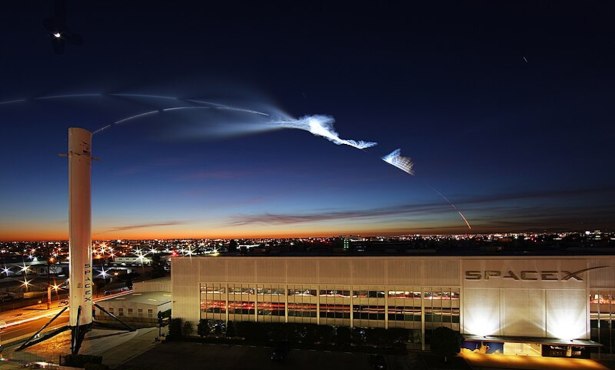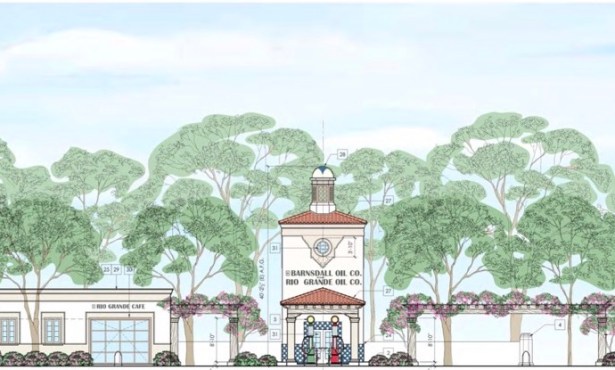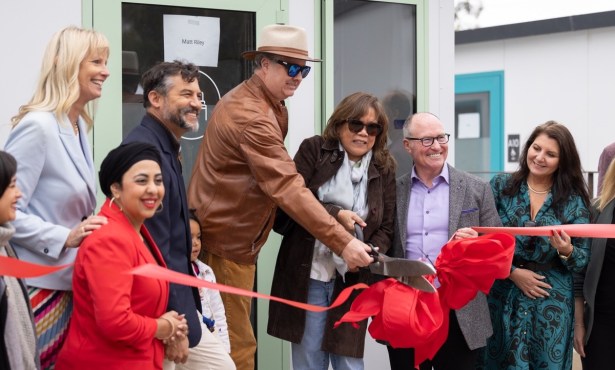Students Protest Anti-Defamation League’s Involvement in UCSB Matter
Professor William Robinson Investigated for Allegedly Anti-Semitic Email
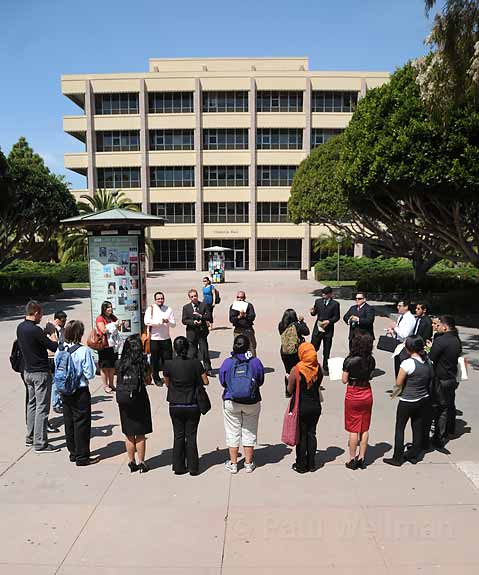
Yesterday, a well-dressed group of students – most of them hailing from sociology and political science graduate programs – descended upon UCSB’s Cheadle Hall to arrange a meeting with Chancellor Henry Yang concerning charges of anti-Semitism that have been levied by the Academic Senate against sociology professor William Robinson, though not without a little hiccup. Stuck in a Cheadle Hall elevator for about 20 minutes, 13 of the students had to wait until university service workers freed them before they could reunite with others in the group. Emerging from the cramped, hot compartment, sighs of relief were uttered as the temporary captives made their way across the hall toward Yang’s office and a nervous-looking secretary who was wondering what they were all doing there. The students said that their group – the Committee to Defend Academic Freedom at UCSB – had been denied a meeting slot with Yang, as the chancellor said he had no comments on the issue.
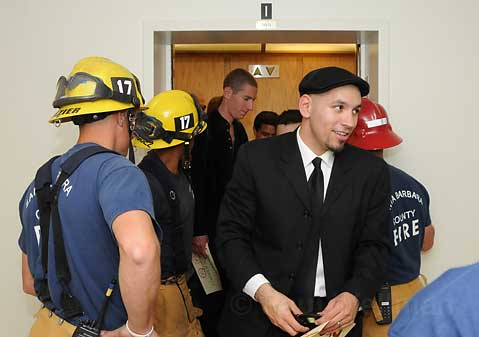
Yang was not in, as he is currently in Washington, DC, but students met with Kevin McCauley, Yang’s executive assistant, who keeps track of the chancellor’s schedule. “We feel that it’s unfair that the administration will meet with an outside organization on this issue and not with an internal group concerned with academic freedom and student affairs,” one of the group’s leaders said, referring to a meeting several members of the faculty had in March with Abraham Foxman, national director of the Anti-Defamation League (ADL).
During that meeting, faculty members who were there said they were invited to lunch with Foxman, supposedly to discuss UCSB’s new Jewish studies program, but that the conversation was centered around an email Robinson – who is Jewish – had sent to 80 students in January that compared Israel’s occupation of Gaza to the Nazi ghettoization of Polish Jews in Warsaw during World War II. “When the meeting started, Foxman quickly launched into what I would call a rant about what he said was an anti-Semitic email that Robinson sent to his class,” said Harold Marcuse, a history professor who was present at the meeting.
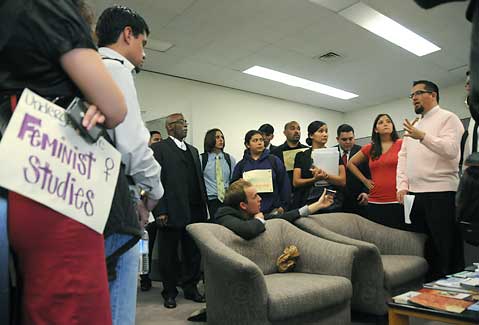
The email in question, which included pictures of German troops during World War II side-by-side with pictures of Israeli soldiers, was pulled from a Web site by Robinson, who added his own commentary at the top of the page. “Controversy is at the heart of academic inquiry,” said Robinson, adding that an American Society of University Professors document titled Freedom in the Classroom states that students should have their beliefs challenged during academic study. “Historical comparison is at the heart of academic freedom.” However, two students in his Sociology 130SG course – Rebecca Joseph and Tova Hausman – were offended by the material and reported it to Los Angeles’s Simon Wiesenthal Center as being anti-Semitic. In the formal complaints filed by the students – which are available on the Committee for Academic Freedom’s Web site – one of the students said she had contacted Robinson by email prior to filing the complaint, but received a response indicating that the email he had sent was for personal information only and not related to course material. “I don’t know the students; they never approached me,” said Robinson.
At the heart of the debate is the issue of how the university should handle disputes over academic freedom. Robinson and his supporters assert that issues such as this one should be dealt with internally, as part of a department’s dynamic process of keeping its curriculum relevant. “The right of the faculty member to impart material that is provocative or offensive is part of the academic process, and students should have the right to respond,” said Dick Flacks, a professor emeritus in UCSB’s sociology department, longtime activist, and active member of Santa Barbara’s Jewish community. “These students went to outside sources – the Simon Wiesenthal Center and ADL – and those groups turned this into a case where this professor was guilty of discrimination. A university is supposed to be a place of dialogue, not a place of allegations and judicial proceedings,” he said, adding that he didn’t blame the students for their actions, but that involving the judicial process in this case damages the academic atmosphere.
Foxman said that he brought up the Robinson issue at the March faculty lunch, but denied applying pressure on UCSB faculty and administration, as has been charged by several of Robinson’s supporters. “We made no demands that [Robinson] be fired or disciplined,” said Foxman. “We weren’t interested in making this a public issue. We wanted to protect the students from intimidation.”
Flacks asserted that ADL and the Wiesenthal Center are agenda-driven – a position echoed by Robinson – and that their involvement in an issue of what he felt was course content was inappropriate. “ADL is a very aggressive right-wing organization that is exercising thought control and represents a danger to the Jewish community at large,” said Robinson.
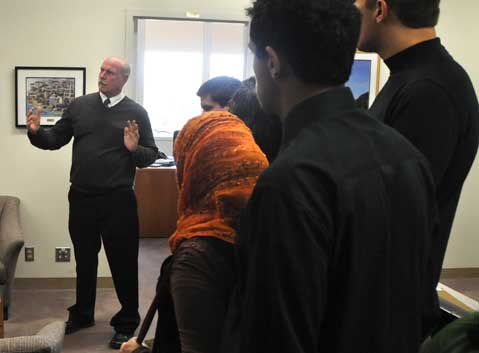
Although Robinson and many of his supporters were adamant that the email was an example of academic freedom, the two students who filed complaints with the university stated that it was an abuse of the teacher-student relationship. “Although he is waving the flag of academic freedom, he is intimidating those students with different viewpoints, and that has a chilling effect on academic freedom,” said Peter Melnick, chair of the Santa Barbara Israel Committee, opining that the email was not actually part of the course material. “I don’t know anybody in the Jewish community who questions Professor Robinson’s right to criticize Israel, but if he wishes to do that in an academic setting, different rules apply.”
The 20 or so students assembled in the antechamber of Chancellor Yang’s office yesterday morning had little to say about whether or not Robinson’s criticism’s of Israeli policy were anti-Semitic, but defended his right to send such an email, and emphasized their wish that academic disputes be kept within academia. “The protection of academic freedom is at the very highest levels of importance to what we do here at the university,” said Young to the students.
According to Paul Desruisseaux, a spokesperson from UCSB’s public affairs office, an ad hoc committee has been formed to investigate charges that Robinson violated the faculty code of conduct. “Until this senate process runs its course, it would be prejudicial for the university to comment on it,” he said. The Committee to Defend Academic Freedom continues its position that the incident did not warrant judicial proceedings to begin with. Jeb Sprague, a member of the organization, said that they have not yet received confirmation of a meeting time from the chancellor’s office, but that they will continue trying to get Yang to agree to meet with four preselected students from the group.

